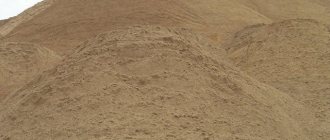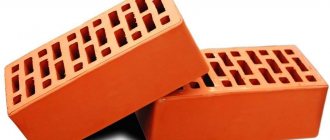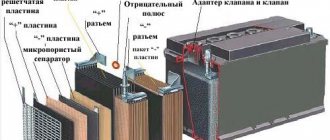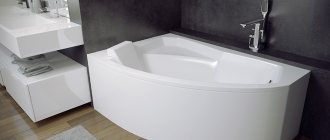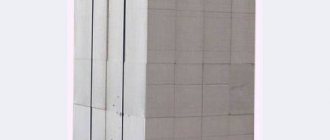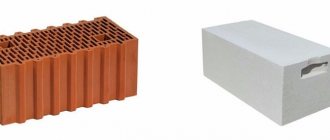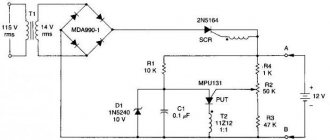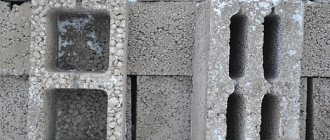Home |Calculation |How much does an expanded clay concrete block weigh?
Date: December 17, 2018
Comments: 0
The increase in the pace of construction activities is due to the introduction of new technologies, the use of energy-saving materials that increase the intensity of work and improve the quality of structures. In connection with this trend, the use of expanded clay concrete, a universal building material, has increased.
Expanded clay concrete blocks are made from it, characterized by increased thermal insulation characteristics, environmental friendliness, and reduced weight. The basis of lightweight concrete products is a cement-sand mixture with the addition of water and expanded clay used as a filler. Expanded clay concrete is characterized by its low weight and reduced density, which determines the thermal conductivity of products.
The weight of the block is an indicator of the quality of the manufactured concrete composite. Characterizes the production features and adherence to the expanded clay concrete recipe. Let us consider in detail the popular material, which is a type of lightweight concrete, and the relationship between weight and characteristics. This will help you choose quality products for construction work.
The insignificant weight of expanded clay concrete m3 contributed to the growing popularity of such products in construction
Application area
The scope of use of expanded clay concrete blocks is related to the purpose of the products. They are divided into the following types:
- Blocks used for the construction of partitions.
- Products used for the construction of capital and internal walls.
Expanded clay block is used when performing construction work related to the construction of:
- structures that can withstand increased loads;
- outbuildings;
- industrial facilities;
- partitions that perform soundproofing functions;
- premises for vehicles;
- monolithic structures.
When deciding to use expanded clay-based composite concrete, pay attention to the weight of the expanded clay block associated with the correctly selected composition of the material. The weight of one block depends on the design features and ranges from 5.1-34.3 kg.
The construction industry is constantly evolving: new technologies, materials and methods are being introduced to make work easier
Weight of expanded clay concrete block 400x200x200 according to GOST
- frost resistance – F-35 – F-50;
- thermal conductivity – 0.19 W/m*°C;
- compressive strength – 65kg/cm2;
- shrinkage – 0%;
- water absorption - 50%.
The construction of country houses, garages, sheds, and outbuildings is not complete without the use of wall stone. The variety of shapes and textures allows it to be used for decorating architectural structures.
Due to their light weight, expanded clay concrete blocks can be used in monolithic construction as filler for the frame.
However, experts do not recommend using it when laying a foundation due to its fragility.
Types of expanded clay concrete
Wall stones are divided into two types depending on the mass and are:
According to their intended purpose, expanded clay blocks are also divided into two types:
Date: December 17, 2018
How much does an expanded clay concrete block weigh?
The insignificant weight of expanded clay concrete m3 contributed to the growing popularity of such products in construction
Application area
The scope of use of expanded clay concrete blocks is related to the purpose of the products. They are divided into the following types:
- Blocks used for the construction of partitions.
- Products used for the construction of capital and internal walls.
Expanded clay block is used when performing construction work related to the construction of:
- structures that can withstand increased loads;
- outbuildings;
- industrial facilities;
- partitions that perform soundproofing functions;
- premises for vehicles;
- monolithic structures.
When deciding to use expanded clay-based composite concrete, pay attention to the weight of the expanded clay block associated with the correctly selected composition of the material. The weight of one block depends on the design features and ranges from 5.1-34.3 kg.
The construction industry is constantly evolving: new technologies, materials and methods are being introduced to make work easier
Recipe specifics
The basis of the expanded clay block is a cement-sand composition and expanded clay, which has a spherical shape. The aggregate is obtained from clay fired at a high temperature. The concentration of expanded clay in the mass determines how much the expanded clay concrete block weighs and what its strength is.
The array consists of the following ingredients:
- Filler in the form of expanded clay with a particle size of up to 1 centimeter.
- Fine sand.
- Portland cement.
- Water.
In the manufacture of expanded clay blocks, a number of main ingredients are used, including expanded clay, construction sand, cement mixture, and water.
Varieties
Depending on the design features (presence of cavities), expanded clay concrete blocks are manufactured in the following options:
Characteristics
Correct analysis of the parameters of expanded clay concrete products will allow you to purchase high-quality building materials to solve specific construction problems
Unscrupulous manufacturers, using low-quality raw materials, violating technology, are trying to reduce costs associated with production. They offer customers blocks called expanded clay concrete, but differing in performance characteristics.
Product quality indicators are characterized by the following characteristics:
The use of laboratory control methods makes it possible to accurately determine these characteristics. The ability to control parameters using special equipment is not always available.
Increased weight indicates a violation of the technology, recipe, or the use of low-quality filler mixed with heavy screenings or brick waste. A building made from such expanded clay concrete blocks will be cold and have reduced strength.
Conclusion
Originally posted 2017-01-21 08:17:48.
Recipe specifics
The basis of the expanded clay block is a cement-sand composition and expanded clay, which has a spherical shape. The aggregate is obtained from clay fired at a high temperature. The concentration of expanded clay in the mass determines how much the expanded clay concrete block weighs and what its strength is.
The strength characteristics of expanded clay concrete products and the ability to conduct heat are connected by a certain relationship. As the strength of structures built from expanded clay concrete increases, the coolness in the room increases. These parameters are influenced by the size of expanded clay, the volume of air cavities in the mass, and the recipe.
The array consists of the following ingredients:
- Filler in the form of expanded clay with a particle size of up to 1 centimeter.
- Fine sand.
- Portland cement.
- Water.
The ratio of expanded clay, cement, water and sand is expressed as 6:1:1:3. Special tables developed by expanded clay concrete manufacturers indicate how much a certain type of block weighs. Before purchasing the necessary material, it is advisable to familiarize yourself with the range and characteristics of products offered by manufacturers.
In the manufacture of expanded clay blocks, a number of main ingredients are used, including expanded clay, construction sand, cement mixture, and water.
Expanded clay concrete: Weight Brands Density Price
See also: Screed with expanded clay
Expanded clay concrete is divided into 3 main types:
- Thermal insulating expanded clay concrete
- Structural expanded clay concrete
- Structural thermal insulation expanded clay concrete
Brands of Expanded Dite Concrete Concrete class and its price:
- Brand M50 Concrete class B3.5 Price 3100 per 1 cubic meter
- Brand M100 Concrete class B7.5 Price 3500 per 1 cubic meter
- Brand M150 Concrete class B12.5 Price 3750 per 1 cubic meter
- Brand M200 Concrete class B15 Price 3850 per 1 cubic meter
- Brand M250 Concrete class B17.5 Price 3850 per 1 cubic meter
Related articles: Density of expanded clay concrete kg m3
Expanded clay concrete blocks 1m3 and their price:
- Hollow block 390*280*188 - price 3100 rubles per 1 cubic meter (48 pieces per cubic meter)
- Hollow block 390*250*188 - price 3100 rubles per 1m3 (54 pieces per 1m3)
- Partition block 290*90*188 hollow - price 3100 rubles (144 pieces per 1m3)
- Block 390*190*188 solid - price 3700 RUR (72 pieces per 1m3)
See also: Calculation of reinforcement
Expanded clay concrete weight 1 m3
This type of expanded clay concrete should not provide high reliability and strength; its low weight is ensured by the weight of expanded clay and its quantity.
The weight of 1m3 of expanded clay concrete starts from 350 kg (thermal insulation) and reaches 1800 kg (structural)
Related articles: Correct blind area
Thermal insulating expanded clay concrete
Thermal insulating and structural expanded clay concrete
Thermal insulating and structural expanded clay concrete comes in the following grades:
Volumetric weight starts from 700 and reaches 1400 kg/m3
See also: Concrete in winter
Structural expanded clay concrete
Also quite often, when producing expanded clay concrete, expanded clay aggregate and quartz sand are added, without adding expanded clay sand.
Kawabanga! How thick should a wall made of aerated concrete be?
As a binder in the production of expanded clay concrete, Portland cement of grade 400 and higher is used, with a minimum content of pozzolanizing, as well as slag Portland cement.
The weight of expanded clay concrete depends on the degree of porosity of expanded clay and its content in concrete. The weight of a block of 200 by 200 by 400 expanded clay concrete can be from 6 and reach up to 29 kg.
Varieties
Depending on the design features (presence of cavities), expanded clay concrete blocks are manufactured in the following options:
- Solid, which are characterized by increased strength indicators and a dense structure of a solid mass. The one-piece design prevents the formation of fungi and mold. The weight is up to 26 kilograms depending on the size, and the specific gravity is about 1.5 t/m3.
- Hollow, having blind or through cavities, characterized by low weight. The weight of an expanded clay concrete block measuring 390x190x188 is 12-17 kg. This depends on the number and shape of the cavities.
Depending on the features of the technological equipment used, products from different manufacturers may differ in size. In particular, products with dimensions of 390x190x188 from different product suppliers may have deviations and be 390x190x190. In addition, the standard sizes of expanded clay concrete blocks are often rounded in conversation to round numbers, for example 200x200x400.
What weight do different expanded clay concrete blocks have?
You can find out the weight of one block, as well as the weight of a loaded pallet or cubic meter of material in the description of each type. The lightest type is partition with two voids. It is suitable for the construction of internal structures not intended for loads. Its weight varies depending on the size: 390x80x188 mm - 6 kg, 390x90x188 mm - 7 kg.
A solid partition block is used to erect walls inside buildings that are expected to experience certain loads, for example, the weight of a heating boiler or a huge TV. The weight of the product measuring 390x90x188 mm is 9 kg.
There are four types of wall blocks. Standard ones have dimensions of 390x190x188 mm. They are presented in the form of solid products, as well as double-hollow and four-hollow. Blocks that do not contain voids are the heaviest. Their weight is 18 kg. The weight of the product with two voids is 12 kg, and with four – 13 kg. The six-hollow block has dimensions of 390x290x188 mm. Its weight reaches 22 kg.
Foundation blocks have a minimum void ratio. They have no pores, which is due to operating conditions. The size of the products is standardized - 390x190x188 mm. One segment weighs 31 kg.
Expanded clay concrete blocks are lighter than many other building materials. Their use allows you to reduce financial and time costs, reduce the load on load-bearing foundations and structures several times.
Characteristics
When deciding on the choice of material for construction, developers have to solve a serious question: how to purchase quality products at an affordable price? The weight of expanded clay concrete products characterizes their quality. Knowing the properties of expanded clay concrete, you can avoid mistakes when purchasing low-quality expanded clay concrete blocks.
Correct analysis of the parameters of expanded clay concrete products will allow you to purchase high-quality building materials to solve specific construction problems
Unscrupulous manufacturers, using low-quality raw materials, violating technology, are trying to reduce costs associated with production. They offer customers blocks called expanded clay concrete, but differing in performance characteristics.
Product quality indicators are characterized by the following characteristics:
- the ability to withstand compressive loads that amount to more than 100 kg per 1 square centimeter;
- resistance to the effects of cycles of freezing of products with subsequent thawing, allowing them to maintain strength characteristics for at least 50 years;
- ability to conduct heat, the value of which is up to 0.57 W/m˚C;
- water absorption coefficient corresponding to marking values up to W14;
- shrinkage value of 0%, which characterizes the constancy of product dimensions after completion of construction.
The use of laboratory control methods makes it possible to accurately determine these characteristics. The ability to control parameters using special equipment is not always available.
Knowing the mass of the product, for example, the weight of an expanded clay concrete block 400x200x200, which ranges from 12 to 26 kg for various types of products, you can determine the specific gravity and make a conclusion about the compliance of the product density with the indicators declared by the manufacturer. Depending on the type of product, the density should be from 0.75 to 1.4 tons per cubic meter. This parameter allows us to make a conclusion about the conformity of product quality.
Increased weight indicates a violation of the technology, recipe, or the use of low-quality filler mixed with heavy screenings or brick waste. A building made from such expanded clay concrete blocks will be cold and have reduced strength.
Concrete blocks
Concrete blocks are used for the construction of columnar and strip foundations. Monolithic blocks are suitable for low- and high-rise buildings, private houses, and can be used for the construction of walls of basements, cellars and basements.
When creating monolithic foundations, hollow blocks can be used as formwork: before pouring, reinforcing bars are installed in them. Also, blocks with voids can be used where communications need to be laid.
The characteristics and properties of the blocks may vary depending on the composition, quality of the components, and the addition of various additives. Standard blocks must meet the following parameters: weight about 31 kilograms, frost resistance at the F50 level, strength grade M100 and higher. When choosing concrete blocks, the following factors are taken into account: climate, soil density and moisture, shrinkage, expected loads on the base.
Sand-cement
According to the current GOST 6133-99, products with dimensions of 20, 20, 40 centimeters can be made from different types of concrete. Sand-cement blocks are made from a cement-sand mixture using vibrocompression. This technology allows us to obtain very compressive and durable products with ideal geometric parameters and declared characteristics.
Sand concrete blocks with dimensions of 20x20x40 centimeters are used in the construction of load-bearing walls, foundations, support columns, and plinths. When laying a wall, you can get a thickness of half a block, as well as one/one and a half/two. Due to its good strength and high thermal insulation properties, hollow sand-cement stone is used in the masonry of external walls.
